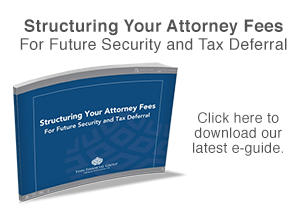Structured Settlements vs. Stocks
November 20, 2013 – It’s too bad Las Vegas isn’t taking bets on this hypothetical match-up: Structured settlements vs. stocks.
I’m not much of a gambler myself but if I were and they were, I’d put a whole lot of money on structured settlements coming out on top.
 And if yesterday’s CNNMoney article, “Welcome to the 4% return market” is any indication, I wouldn’t be alone since “among a growing group of forecasters, 4% is becoming something of a consensus.”
And if yesterday’s CNNMoney article, “Welcome to the 4% return market” is any indication, I wouldn’t be alone since “among a growing group of forecasters, 4% is becoming something of a consensus.”
If you don’t want to read the short article yourself, here’s one of the major take aways:
Since The Great Depression, stocks have risen just 4% a year in the decade following a market where P/E ratios have traded where they are now.
But we’d like to remind you: When stocks are cashed out, taxes are due on the gain whereas structured settlement payouts stemming from a personal, physical injury claim are paid 100% income tax-free.
In other words, the experts are predicting that the best case scenario for stocks is right about where tax equivalent yields for structured settlements are right now.
So we can’t help wondering:
Who would willingly risk being on the losing end of a bet whose best case scenario equals the guaranteed sure thing?
The worst case scenario for stocks, of course, is something like 2009 all over again even if that scenario seems unlikely. In poker, they’d call that hand a bust.
So even though nobody’s actually taking bets on the imaginary structured settlement vs. stocks card, we’ve got our phantom money riding on structured settlements all the way.
Every situation is unique, of course, but those who choose the tried and true method of resolving their personal injury claim with a structured settlement always leave the tables with money in their pockets.
And that’s the closest thing to a sure bet as you’re ever likely to see.
Posted: November 20, 2013 | by dan | Category: Articles, Blog, Structured Settlements



















